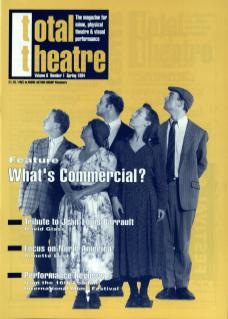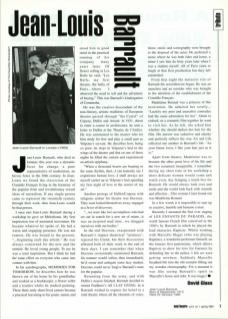Jean-Louis Barrault, who died in January this year, was a dynamic force for change, a pure representative of modernism, an heroic force in the 20th Century. In Jean-Louis we found the classicism of the Comédie Français living in harmony with the popular front and revolutionary sexual ideas of surrealism. If any single person came to represent the twentieth Century through their work, then Jean-Louis would be that person.
I once met Jean-Louis Barrault during a workshop he gave on Melodrama. My first impression was of mercurial movement. He became whatever he spoke of. He had a warm and engaging presence. He was not remote. He was bound to the present, ‘...beginning each day afresh’. He was always concerned for the new and the untried. He loved young people. To me he was a total inspiration. But I think he had the same effect on everyone who came into contact with him.
In his autobiography, Memories for Tomorrow, he describes how he was thrown out of his home by his grandfather and worked as a bookkeeper, a flower seller and a teacher whilst he studied painting. These three early short-lived careers became a practical leavening to his poetic nature and stood him in good stead in the practical running of his company many years later. Of flower selling in Les Halles he said, ‘Les Halles, my first theatre, the belly of Paris...where I observed the need to sell and the adventure of buying.’ This was Barrault's kindergarten of Commedia.
He was the creative descendant of the non-literary, artistic traditions of European theatre passed through the ‘Cartel’ of Copeau, Dullin and Artaud. In 1931, about to enter a course in architecture, he sent a letter to Dullin at the Théâtre de l'Atelier. He was summoned to the master who let him study for free and play a small part as Volpone's servant. He describes how, being so poor, he slept in Volpone's bed in the wings of the theatre and that on one of those nights he lifted the curtain and experienced an artistic epiphany.
‘When a thousand hearts are beating to the same rhythm, then...I can honestly say I experience human love... I shall always see myself curled up in Volpone's bed spending my first night of love at the source of my art.’
Another protégé of Dullin/Copeau with religious ardour for theatre was Decroux. They soon locked themselves away, engaged in a fever of discovery.
‘...we were like two accomplices who had set out in search for a new art of mime...it was an inspired mad time...we drugged ourselves with our bodies.’
In the end Decroux, exasperated with Barrault's impure theatrical ‘tartiness’, rejected his friend, but their discoveries affected both of their work to the end of their days. I can remember that when Decroux occasionally mentioned Barrault his manner would soften, then immediately he'd swear and castigate some lazy student. Decroux could never forgive Barrault's taste for the popular.
Returning from the army, and with Dullin's season finished, Barrault decided to mount Faulkner's As I Lay Dying. In it Barrault wished to express his belief in a total theatre where all the elements of voice, mime, music and scenography were brought to the disposal of the actor. He perfected a mime where he was both rider and horse, a mime I saw him do forty years later when I was a student myself. All of Paris came to laugh at that first production but they left astonished.
From that night the meteoric rise of Barrault the actor/director began. He was an anarchist and an outsider who was brought to the attention of the establishment of the Comédie Français.
Madeleine Renaud was a princess of this institution. He admired her totally... ‘Luckily my poet and anarchist comrades had the same admiration for her.’ About to embark on a romantic film together he went to visit her. As he left, she asked him whether she should darken her hair for the film. His answer was seductive and cheeky and perfectly reflects the way Art and Life reflected one another in Barrault's life: ‘As your future lover, I like your hair just as it is.’
Apart from theatre. Madeleine was to become the other great love of his life and the two remained inseparable. I remember during my short time in his workshop a short delicate woman would come and watch every day bringing a lunch box for Barrault. He would always look over and smile and she would look back with warmth and affection... This woman I later found out was Madeleine Renaud.
In a few words it is impossible to sum up so creative, humble and humane a man.
Recently I mounted the first ever staging of Les Enfants du Paradis, the world famous French film conceived in the 1930s by Barrault in which he played the lead character, Baptiste. Whilst working with Marcello Magni (who was playing Baptiste), a wonderful performer himself, on the famous first pantomime, which allows Baptiste to show his love for Garance by defending her to the police, I felt we were getting nowhere. Suddenly Marcello breathed life into the old scenario filling out my wooden choreography. For a moment it was like seeing Barrault's spirit in Marcello's horse and rider. It was magic!
Jean-Louis Barrault Born 8 September 1910 Died 22 January 1994

